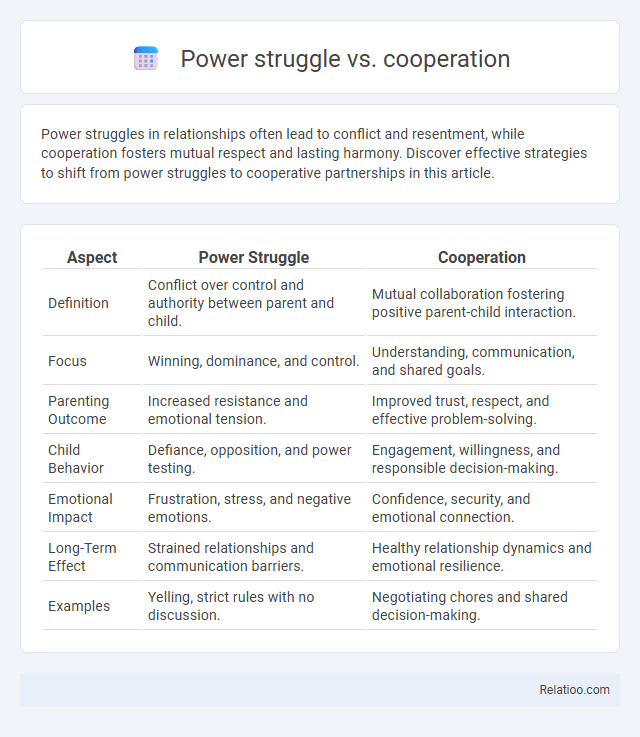Power struggles in relationships often lead to conflict and resentment, while cooperation fosters mutual respect and lasting harmony. Discover effective strategies to shift from power struggles to cooperative partnerships in this article.
Table of Comparison
| Aspect | Power Struggle | Cooperation |
|---|---|---|
| Definition | Conflict over control and authority between parent and child. | Mutual collaboration fostering positive parent-child interaction. |
| Focus | Winning, dominance, and control. | Understanding, communication, and shared goals. |
| Parenting Outcome | Increased resistance and emotional tension. | Improved trust, respect, and effective problem-solving. |
| Child Behavior | Defiance, opposition, and power testing. | Engagement, willingness, and responsible decision-making. |
| Emotional Impact | Frustration, stress, and negative emotions. | Confidence, security, and emotional connection. |
| Long-Term Effect | Strained relationships and communication barriers. | Healthy relationship dynamics and emotional resilience. |
| Examples | Yelling, strict rules with no discussion. | Negotiating chores and shared decision-making. |
Understanding Power Struggle in Relationships
Power struggle in relationships often emerges from conflicting desires for control and dominance, leading to repetitive cycles of conflict that can undermine trust and intimacy. Cooperation involves mutual respect, open communication, and shared goals that foster harmony and strengthen emotional bonds. Understanding your role in power struggles allows you to shift towards cooperative strategies, enhancing relationship satisfaction and resilience.
The Roots of Power Dynamics
The roots of power dynamics stem from inherent human desires for control, influence, and survival within social hierarchies, often manifesting as power struggles or efforts toward cooperation. Power struggles emerge when conflicting interests challenge the distribution of authority, leading to competition and tension. Conversely, cooperation arises when parties recognize mutual benefits in shared goals, fostering trust and balanced power relations.
Defining Cooperation: Beyond Teamwork
Cooperation transcends simple teamwork by emphasizing mutual goals, shared responsibilities, and collective problem-solving rather than individual power claims. Your ability to foster genuine collaboration diminishes power struggles, as cooperation builds trust and aligns diverse interests toward common success. Understanding cooperation involves recognizing its role in creating synergy that empowers all members, rather than perpetuating competitive dominance.
Power Struggle vs Cooperation: Key Differences
Power struggle involves competing for dominance and control, often leading to conflict, whereas cooperation emphasizes collaboration and shared goals to enhance group performance. In power struggles, communication tends to be defensive and confrontational, while cooperation fosters open, transparent dialogue that builds trust. The outcomes of power struggles are typically divisive and reduce productivity, whereas cooperation improves problem-solving and promotes mutual success.
Psychological Effects of Power Struggles
Power struggles often trigger heightened stress levels, anxiety, and diminished self-esteem due to constant conflict and competition. Cooperation fosters psychological well-being by promoting trust, reducing tension, and enhancing social support, which leads to increased motivation and emotional resilience. Persistent power struggles can result in chronic psychological distress, including burnout and impaired decision-making, undermining overall mental health and group dynamics.
Benefits of Fostering Cooperation
Fostering cooperation enhances communication, strengthens team dynamics, and increases productivity by aligning individual goals with shared objectives. Your organization benefits from a collaborative environment where trust and mutual support reduce conflicts and promote innovative problem-solving. Prioritizing cooperation over power struggles ultimately creates a sustainable culture of collective success and long-term growth.
Real-Life Examples: Power Struggle vs Cooperation
Power struggles often manifest in workplace conflicts where competing departments vie for resources, leading to decreased productivity and morale. In contrast, cooperation is exemplified by cross-functional teams that integrate diverse skills to achieve common organizational goals, boosting efficiency and innovation. Your ability to foster collaboration over competition can transform potential power struggles into opportunities for collective success.
Strategies to Shift from Power Struggle to Cooperation
Shifting from power struggle to cooperation requires emphasizing active listening and empathy to understand the other party's perspectives genuinely. You can implement conflict resolution techniques such as interest-based negotiation, which focuses on shared goals rather than competing demands, fostering mutual respect and trust. Establishing clear communication boundaries and seeking common ground strategies help transform adversarial interactions into collaborative efforts for sustainable outcomes.
Overcoming Barriers to Effective Cooperation
Overcoming barriers to effective cooperation requires recognizing and addressing underlying power struggles that can hinder collaboration. You must foster open communication, build trust, and establish shared goals to transform conflict into collective success. Prioritizing mutual respect and understanding helps break down resistance and promotes a cooperative environment.
Building Sustainable Cooperative Environments
Power struggles within organizations often undermine trust, reduce productivity, and hinder long-term growth. Building sustainable cooperative environments requires fostering open communication, shared goals, and mutual respect among team members to align interests and enhance collaboration. Implementing conflict resolution strategies and promoting inclusive leadership cultivate resilience and innovation, essential for enduring organizational success.

Infographic: Power struggle vs Cooperation
 relatioo.com
relatioo.com